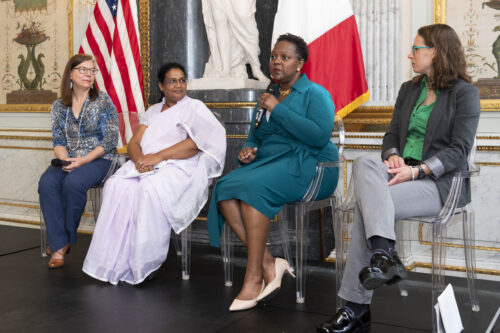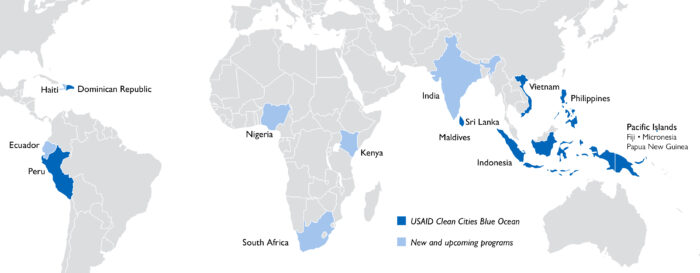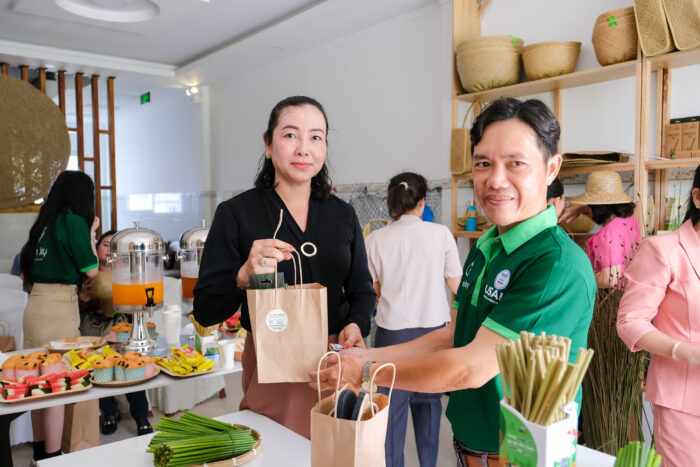USAID Calls for Collective Action at Local and National Levels to Reduce Plastic Pollution

May 2023 – The U.S. Agency for International Development (USAID) participated in multiple side events at the second session of the United Nations Intergovernmental Negotiating Committee (INC) on plastic pollution—a gathering of global leaders to develop the first-ever legally binding international treaty on plastic pollution. At an INC-sponsored side event, USAID shared lessons from Clean Cities, Blue Ocean—the Agency’s global flagship program under the Save our Seas Initiative—and highlighted proven solutions that are building capacity and enabling change at the local, national, and regional levels.
USAID started the session by reiterating the United States’ commitment to addressing ocean plastic pollution. In June 2022, USAID launched the Save Our Seas Initiative—a global effort to combat ocean plastic pollution that aims to end plastic pollution by 2040. To date, the initiative has included $103 million in FY21 and FY22 funding and was designed to support implementation of the landmark Save Our Seas 2.0 Act of 2020. In addition to Clean Cities, Blue Ocean, the Save Our Seas Initiative includes 14 bilateral and regional USAID programs in key countries and regions that represent 40 percent of total global mismanaged plastic waste.

At the initiative’s helm, USAID’s Clean Cities, Blue Ocean program has awarded over $6.9 million in grants to more than 43 local organizations and in-kind support to 8 city governments to implement effective, locally-led solutions that address ocean plastic pollution. This has allowed USAID to test and share a wide variety of approaches to combating ocean plastics in different countries and contexts.
USAID’s approach to solving the problem of plastic pollution includes both upstream and downstream solutions—a holistic approach that involves working with everyone involved in the production, management, and disposal of plastic waste. That includes building local government capacity to strengthen solid waste management and recycling systems, improving collaboration with the local actors responsible for waste management and recycling like informal waste collectors, and developing integrated national policies and regulations that bolster local systems such as Extended Producer Responsibility schemes.
In her remarks, Clare Romanik, USAID’s Lead Ocean Plastics and Urban Advisor, emphasized that “both local and national policies—ones that can be implemented and enforced, have the necessary buy-in, and that ultimately improve, not make worse, the lives of waste workers—are the foundation for sustainable and effective waste management systems.”
One example given was USAID’s work in Vietnam. The Government of Vietnam has been proactive in taking steps to address plastic pollution and issued a National Action Plan on Marine Plastic Debris Management in 2019, which aims to reduce plastic litter in oceans by 50 percent by 2025 and by 75 percent by 2030. Since 2016, USAID has partnered with the Government of Vietnam to accomplish these goals and has focused on forging collaboration among key local actors—the Government of Vietnam, the private sector, social organizations, academic institutions, and citizens for collective action efforts in reducing plastic pollution at all levels. Through a series of projects, USAID’s work has helped improve policies, pilot, and scale up plastic waste reduction and management models, and improve the capacity of local governments, organizations, and communities to address plastic pollution.

Other examples included both the Dominican Republic and Peru, where national governments are supporting local efforts—using their resources to finance investment in local and regional waste infrastructure. Clare noted that, “Cities that do their part in collecting waste fees and improving services should be prioritized for such assistance. Furthermore, the private sector has a role to play to enable change at the local, national, and regional levels, most notably in Extended Producer Responsibility schemes, in order to strengthen infrastructure for the collection and recovery of plastic waste.”
Building on the lessons from the first year of the Save Our Seas Initiative and work under the Clean Cities, Blue Ocean program, USAID will continue to scale up and expand these approaches for greater impact. For more information on the Save our Seas Initiative watch the World Oceans Day virtual event that highlights what USAID has achieved one year after launching the initiative, read the annual report, or visit the Clean Cities, Blue Ocean website to learn more.

